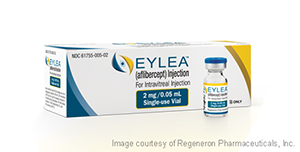Eylea (Aflibercept)

What is Eylea(Aflibercept)?
Eylea (Aflibercept) is a new FDA approved drug developed for the treatment of wet age-related macular degeneration (wet AMD). Age-related macular degeneration (AMD) is an eye condition that causes damage to the macula, a small area in the retina responsible for the sharp central vision that allows you to see fine details clearly. It is a leading cause of blindness and is most common in individuals above 50 years of age.
Wet macular degeneration occurs due to abnormal growth of blood vessels under the macula. These new blood vessels are fragile causing blood and fluids to leak from them, affecting the normal functioning of the macula. Wet AMD accounts for only a small percentage of the macular degeneration cases. Dry Macular Degeneration may also lead to wet macular degeneration in advanced stages. Progression in wet macular degeneration is very fast and may lead to significant loss of central vision within a few days or weeks. The treatment of Wet macular degeneration involves destroying the abnormal blood vessels and preventing their further growth.
Eylea (Aflibercept) has now become the treatment of choice for Wet AMD. In patients with wet AMD abnormally high levels of vascular endothelial growth factor (VEGF) and placental growth factor (PlGF), growth factors that promote the growth of new abnormal blood vessels, are secreted in the eyes. Eylea is a recombinant fusion protein that blocks the action of both growth factors: VEGF and PlGF.
The Eylea is administered as an eye injection in a dosage of 2 mg initially with one injection per month for three consecutive doses, followed by one injection every two months. No monthly monitoring is required in between the injections.
Uses of Eylea Treatment
The use of Eylea for the treatment of wet AMD can help retard vision loss and improve sight. Early detection of disease and timely treatment is critical in preventing vision loss due to macular degeneration.
Side effects of Eylea
The most common side effects reported in patients receiving EYLEA were :
- Eye pain
- Bleeding in the white part of the eye at the site of injection
- Cataract
- Vitreous detachment
- Vitreous floaters
- Increased pressure within the eye.
Related Topics:
- Lifestyle Lenses for Cataracts
- Toric Lenses
- Multifocal Lens Implant
- Refractive Lens Exchange
- Cataract Surgery in People with Retinal Diseases
- Age-Related Macular Degeneration
- Diabetic Retinopathy
- Retinal Vascular Diseases
- Anti VEGF
- Eylea (Aflibercept)
- Lucentis
- Avastin
- Intravitreal Steroids
- Ozurdex
- IIuvien
- Retinal Laser (Pattern and Micropulse/Subliminal laser)
- Oral Immunosuppression for Uveitis
- Treatment for Cataract
- Cataract Surgery in Diabetics
- YAG Capsulotomy
- YAG Iridotomy
- Macular Laser for Central Serous Retinopathy
- Macular Laser for Macular Oedema
- Cataract Surgery in Ocular inflammation
- Retinal Laser therapy
- Treatment of Posterior Uveitis
- Selective Laser Trabeculoplasty
- Treatment of Glaucoma
- Retinal Disease Treatment
- Intraocular Lens (IOL)
- Digital Retinal Photography
- Intravitreal Injection for Macular Oedema
- Treatments for Diabetic Macular Oedema
- Treatments for ARMD
- Ocular Ultrasound
- Gonioscopy
- Panretinal Photocoagulation
- Panretinal Photocoagulation for Ocular Ischemic Syndrome
- Treatment for Vein Occlusions
- Treatment of Acute/Chronic/Recurrent Iridocyclitis












